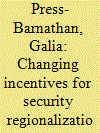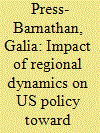|
|
|
Sort Order |
|
|
|
Items / Page
|
|
|
|
|
|
|
| Srl | Item |
| 1 |
ID:
065945


|
|
|
| 2 |
ID:
138099


|
|
|
|
|
| Summary/Abstract |
This paper examines American policy regarding regional security arrangements (RSAs) in Asia. It argues that it is American perceptions of regional interest in such RSAs and of the compatibility of the goals of regional partners with those of the United States, which eventually shape American policy. After discussing the potential value and cost of RSAs, it suggests that actual policy choices are shaped largely as a reaction to regional states’ motivations and policies. Since in Asia, there was limited functional pooling effect to be gained from RSAs, changes in American policies reflected much more a reaction to changes in regional interest in such arrangements. This interaction is demonstrated through a review of post-Cold War developments regarding US RSA policy, distinguishing between the early years of transition to unipolarity and the erosion of unipolarity since the late 1990s. These are also compared to earlier American policy regarding RSAs during the Cold War.
|
|
|
|
|
|
|
|
|
|
|
|
|
|
|
|
| 3 |
ID:
076991


|
|
|
|
|
| Publication |
2006.
|
| Summary/Abstract |
The shift to unipolarity has introduced new dilemmas for America's allies. Their level of strategic uncertainty has increased, largely because under unipolarity, allies' threat perceptions are more likely to diverge across time or issue areas and are not shaped as much by structural systemic factors. Although they want to maintain the pre-existing security arrangements as a means of managing the rising uncertainty, allies need to deal with the dual concern of either being trapped into the hegemonic partner's policies, or being abandoned by the hegemon. These two concerns - the alliance security dilemma - may become more or less prominent given the nature of the divergence in threat perceptions on different issues and at different times. To deal with this dual threat, allies employ two strategies: using the pre-existing alliance as a pact of restraint, and developing a division of labor with the hegemon. Both the dilemmas and the strategies used to mitigate them are examined here in the context of the European behavior within nato following the Gulf War, the nato involvement in Kosovo, the war in Afghanistan, and the war in Iraq.
|
|
|
|
|
|
|
|
|
|
|
|
|
|
|
|
| 4 |
ID:
172556


|
|
|
|
|
| Summary/Abstract |
This article uses the 2019 Eurovision Song Contest (ESC) that took place in Tel Aviv to explore how cultural mega-events serve both as political arenas and as tools for identity construction, negotiation and contestation. These processes of identity politics are all conducted across national–subnational–international–transnational levels. The hosting of mega-events fleshes out these multiple processes in a very strong manner. We first discuss the politics of hosting mega-events in general. We then examine the identity politics associated more specifically with the Eurovision Song Contest, before examining in depth the complex forms of identity politics emerging around the competition following the 2018 Israeli victory. We suggest that it is important to study together the multiple processes—domestic, international and transnational—of identity politics that take place around the competition, as they interact with each other. Consequently, we follow the various stakeholders involved at these different levels and their interactions. We examine the internal identity negotiation process in Israel surrounding the event, the critical actors debating how to use the stage to challenge the liberal, western, ‘normal’ identity Israel hoped to project in the contest and how other stakeholders (participating states, national broadcasting agencies, participating artists) reacted to them, and finally we examine the behaviour of the institution in charge, the European Broadcasting Union, and national governments. We contribute to the study of mega-events as fields of contestation, to the understanding of the complex, multilevel nature of national identity construction, negotiation and contestation in the current era, and more broadly to the role that popular culture plays in this context.
|
|
|
|
|
|
|
|
|
|
|
|
|
|
|
|
| 5 |
ID:
070264


|
|
|
| 6 |
ID:
155316


|
|
|
|
|
| Summary/Abstract |
The goal of this paper is to present a broad yet systematic framework for thinking about the role of popular culture (PC) in international conflict management and resolution, from an International Relations perspective. Protracted conflicts often involve a non-material dimension, as they become central elements in the rival states’ sense of identity, and as societies develop over time strong beliefs about the conflict, which help sustain it over time. Popular culture can play an important role in shaping and changing this non-material dimension of international conflicts. This is largely due to the unique characteristics of PC products that can reach a large number of people, and can convey both information and emotions. Despite this potential, the role of PC in international conflicts has not been systematically analyzed, due to internal divides within the field of IR between positivist and critical understandings of what PC is and how it should be studied, and due to the very interdisciplinary nature of PC and its operation, which leads to many discussions of PC within different disciplines that do not engage each other. The paper examines the multiple roles that PC can play in the context of protracted conflicts. It examines its role domestically within states–societies that live under conflict; the role of PC as a foreign policy tool used by governments vis-à-vis the publics of their rival; the role and limits of PC in challenging conflicts and facilitating transitions to peace; and finally the impact of the joint consumption of global PC by citizens of states in conflict. These different roles of PC are illustrated throughout with examples from different protracted conflict around the world. The goal of this framework is to serve as a focal point for research that transcends the disciplinary divides and allows for fruitful engagement.
|
|
|
|
|
|
|
|
|
|
|
|
|
|
|
|
| 7 |
ID:
057585


|
|
|
|
|
|
|
|